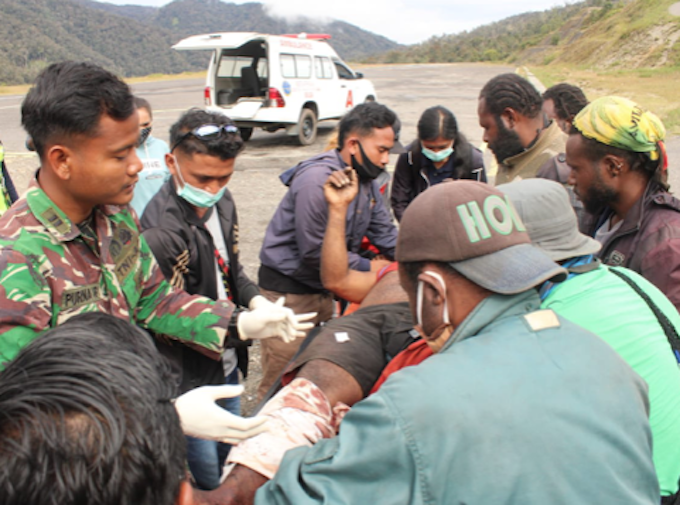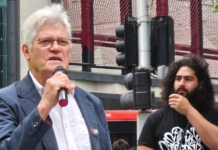
While the delay in the Indonesian government response to the covid-19 corona virus is disappointing, Papua’s provincial government needs to be commended for its speedy awareness of how serious the matter crisis is.
As early as March 22, the Papuan diaspora has urged the government to follow the examples set by Australia, the Netherlands and the United States.
They have said that swift measures are necessary in dealing with the virus to save Papuan lives.
READ MORE: West Papua’s highway of blood – destruction not development – David Robie
Especially considering the circumstances in Papua – one of the most significant being the limited medical facilities.
Mongabay published a great write-up on the circumstances around the self-initiated lockdown in Papua.
The provincial government took steps from March 26, banning inbound flights to Papua and locking down three regions in the interior: Anim-Ha, Lapago and Meepago.
The governor refused to call the measures they applied as a “lockdown”, preferring to call it social restriction.
People in regions more vulnerable
These steps were considered necessary in light of the state of medical facilities in the regions, which makes people there more vulnerable to the rapid spread of covid-19.
Papua took this step before most regions did; Jakarta did not take the steps until the second week of April.
The central government did not respond to it silently.
Tito Karnavian, the Minister of Internal Affairs, expressed his displeasure about the decision. While there is perhaps a charitable reading of these actions, it is difficult to view the public chiding of steps taken to protect Papuan lives in any favourable light.
Instead, it confirms a cynical – or perhaps realistic – reading of Jakarta’s actions, as this letter from Benny Wenda suggests.
Such an unoptimistic reading of Jakarta’s action is perhaps too harsh, but the conditions of political prisoners in Jakarta hardly discourages it.
On May 12, there was a burst of optimism because it was believed that five Papuan political prisoners in Jakarta would be freed in light of covid-19.
Freedom for Jakarta Six
These five prisoners were part of the so-called Jakarta Six, who were convicted of treason last year after demonstrating. Five of them were still serving their sentence. But here again, hope and optimism died when the decision was cancelled later the same day.
Instead, time has resolved the problem, the four prisoners were freed on May 26, and Ariana Lokbere was freed on May 27.
All in all, it is difficult to measure the success of the steps the government took. In contrast, the adverse impact of the steps are more direct and visible.
The more vulnerable regions which have been blocked are feeling the impact of the lockdown. In Paniai (Meepago), markets have reported a shortage of commodities; chicken becoming expensive and imposed ratios to ensure fairness.
Numbers-wise, as of last Saturday (May 23), 51 new people were diagnosed, most of them in Jayapura. That brings the number of people contracted with covid-19 in Papua to 619 people, with 451 receiving treatment, 157 having been cured and 11 people have died.
As of last Thursday (May 28), 673 cases were confirmed in Papua Province and 152 cases of coronavirus recorded in West Papua Province. Suara Papua highlights the case of 32 medical staff testing positive for coronavirus in Papua Province alone.
Mongabay reported that Timika had recorded the second highest cases of coronavirus in Papua Province, where the Grasberg mine owned by US-based Freeport McMoRan is located. But the mining continues the operations amid the request from Mimika Regency Eltinus Omaleng to halt it.
Workers in Freeport said they were frustrated but had no option but to stay in the site as they would risk losing their job.
Meanwhile, in Intan Jaya regency, the residents were shocked by the news of the death of a medical staff member, who was also a member of the covid-19 task force. The West Papua Liberation Army accused Indonesian security forces behind the shooting.
Other reports
The Foreign Correspondent programme on the Australian channel ABC had an edition about Papua and the difficult life in diaspora – The War for West Papua. If you are in Australia, you can watch the episode on ABC iview.
The 1966 book Search for New Guinea’s Boundaries: From Torres Strait to the Pacific by Paul W. van der Veur recounts the colonial origin of the border between the Papuan province and the book is available online from the ANU repository in PDF format.
On International Women’s Day, Voice of Papua crew member Belinda published an audio documentary about three brave women who fought to raise awareness about human rights violations in West Papua.
The documentary, which features exiled human rights lawyer Veronica Koman, was aired on ABC Radio National. There is a written feature too. VOP co-founder Febri is currently working on a film documentary about female activists in Indonesia — stay tuned!
Pacific Journalism Review is also publishing an article by Belinda in July.
RNZ Pacific journalist Johnny Blades published a longform analysis in Lowy Institute’s blog entitled West Papua: The issue that won’t go away for Melanesia.
Rohan Radheya, a filmmaker and journalist in the Netherlands, wrote a long piece on the history of the Chinese mechanic who secretly led a 40-year Melanesian revolution. Read the piece here.
New research maps violence
New research maps violence in the forgotten conflict in West Papua. A group of academics and researchers from the UK and Australia worked together to make the first map that shows the record of violence in West Papua. Explore the map here.
Lachlan McNamee from the University of California, USA, just presented his new research in a zoom meeting on Indonesian transmigration program in West Papua, funded by the World Bank. His research claimed to be the first systematic evidence on transmigration and ethnic cleansing in West Papua.
Papuan novelist and journalist Aprila Wayar recently had a short story translated into English for the literary collective/magazine Intersastra.
On social media, look at the hashtag on #blacklivematters and Papua.
Some Indonesians were moved by the story of the death of George Floyd, a 46-year-old black man, who died in police custody after a white officer handcuffed him and knelt on his neck.
The netizens connected it with the case of a Papuan student Eden Armando Bebari, who was shot to death by Indonesian security forces in his hometown, Timika.
His uni-mate just ignited discussion on social media saying that their friend, Eden, was experiencing the same racism.
This commentary is an edited piece drawn from the Voice of Papua e-letter, a project linked to Suara Papua newspaper. Subscribe to the e-letter here.











































